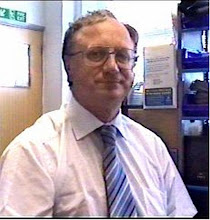On Friday 10th I went to a workshop event held in Bristol. It was organised by Sec-1 a specialist security firm http://www.sec-1.com/ - note the correct address, if you get it wrong you end up at a completely different type of business!
Obviously, these events are to promote the company and their services; however, it wasn't just a massive sales pitch. The main purpose was to offer people advice about maintaining good security practice by illustrating just how easy it is to break into systems and highlighting the reasons why.
The speaker was Gary O'Leary-Steele and he spoke with passion, conviction and great deal of knowledge. He indicated that they have carried out many investigation tests over the years, and in most cases they could use the same report over and again, but just change the name of the organisation. This is particularly the case in the 150 NHS trusts they have investigated, but is also often true of many private sector businesses.
He stated that in many cases, people have failed to adequately install patches which have been issued for specific problems, often long after the issue has been identified. As it happens, I did a quick search on MS06-040 & MS08-067, the two main culprits and the autocomplete worked in each case after just the first 4 characters, the problem is so well known.
He went on to discuss some of the most common problems and illustrated how they could be used to access systems. He also went on to demonstrate how easy it can be to identify vulnerable systems, get access to accounts with innappropriate levels of security permission, crack passwords and elevate permissions. In most cases, the team of testers expect to get access within 30 mins - if they take longer than an hour, the others tease them unmercifully!
Most of the tools that they use are available quite freely on the Internet. In some cases, they do use items that have been commercially written and there is a small charge, but generally those ones are for the real high end stuff. Each has their own favourites in much the way that people do with most other kinds of software.
Whilst going through the potential problems, Gary also indicated some of the possible solutions, often by using the software tools to confirm the problem, then implementing suitable practice or policy to ensure that something is done to minimise the problem or reduce the impact.
It should also be identified that many of the exploits that were identified were in Microsoft OS or software; but the speaker also very carefully highlighted that issues are just as prevalent in other software products. Mac, Linux, Adobe etc, were all shown to be just as insecure. In many cases, this was due to installation or configuration, but equally there were many flaws straight out of the box.
I'm not a security specialist, although I have had some training in this area. I also enjoy some of the work involved, although it has to be said I don't think that I have the necessary skills to make this my specialism. However, I think that I know enough to be able to state that there are a lot of people that suffer with "delusions of adequacy"; they think that because they use a particular product, or do a specific thing, that makes them invulnerable. Often, they are so wrong that it is difficult to know how to take them seriously in anything.
I'm going to say that it was a great day, a really useful workshop and I was very impressed by the whole event. If they organise any more (and I'm told they certainly hope to) I would very strongly suggest that you grab the opportunity to get along and take advantage of the information and advice that they are willing to hand out free of charge.
Subscribe to:
Post Comments (Atom)

No comments:
Post a Comment